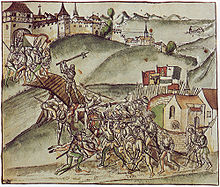Old Zürich War
| Old Zürich War / Alter Zürichkrieg | |||||||||
|---|---|---|---|---|---|---|---|---|---|
 Eastern Switzerland in the mid-15th century: Territories of the Sieben Orte of the Swiss Confederacy
Associates of the Swiss Confederacy
Lands of Frederick VII, Count of Toggenburg, as of 1436
Modern Swiss border | |||||||||
| |||||||||
| Belligerents | |||||||||
|
|
| ||||||||
| Commanders and leaders | |||||||||
|
| Unknown | ||||||||
The Old Zürich War (
Count of Toggenburg
.
In 1436, Count
Habsburg
.



The forces of Zürich were defeated in the
Dauphin via Basel to relieve the city. In the Battle of St. Jakob an der Birs near Basel on 26 August 1444, a blocking force of roughly 1,600 Swiss confederates was defeated, but inflicted such heavy losses on the French (2,000 killed) that the Dauphin decided to retreat. The confederacy and the Dauphin concluded a peace in October 1444, and his mercenary army withdrew from the war altogether.[1]
In May 1444, the confederacy laid siege to
Murder of Greifensee
. Even in this time of war, such a mass execution was widely considered a cruel and unjust deed.
By 1446, both sides were exhausted, and a preliminary peace was concluded. The confederation had not managed to conquer any of the cities of Zürich except Greifensee; Rapperswil and Zürich itself withstood the attacks. In 1450, the parties made a definitive peace and Zürich was admitted into the confederation again, but had to dissolve its alliance with the Habsburgs.
The significance of the war is that it showed that the confederation had grown into a political alliance so close that it no longer tolerated separatist tendencies of a single member.
See also
- Battles of the Old Swiss Confederacy
- Johannes Fründ
References
- ISBN 978-0195334036.
![]() Media related to Old Zurich War at Wikimedia Commons
Media related to Old Zurich War at Wikimedia Commons
- Old Zurich War in German, French and Italian in the online Historical Dictionary of Switzerland.
- Werner Meyer: Battle of St. Jakob an der Birs in German, French and Italian in the online Historical Dictionary of Switzerland, 2012.
